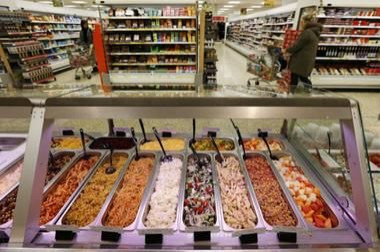A Horse, Of Course! French Revive Their Taste For Equine Flesh

The expanding horsemeat scandal in Ireland, Great Britain and other parts of Europe (where beef was mislabeled) has triggered an unusual reaction in France – sales of equine flesh has jumped by 15 percent as the public’s appetite for the delicacy grows.
Long a staple for the French working class, horsemeat is largely shunned in the Anglophone nations. Even in France, horsemeat consumption has plunged over the past decade. The Guardian newspaper reported that the average Frenchman eats only about two-thirds of a pound of horse flesh annually (or about 20,000 tons every year), an 80 percent drop in 30 years. Italians consume about twice as much.
"A nice horse steak, quickly seared on both sides, and served rare: delicious," Palmira Munio, a retired seamstress at Richard Lenoir market near Bastille in Paris told the paper.
Daniel Adam, one of France’s estimated 700 remaining artisan horsemeat butchers, said more and more people (especially the young, increasingly) in the country are reviving their interest in eating horse, as well as other organic foods, as processed meals drop in popularity. Horsemeat, which is eaten now by only about one-sixth of French households, appeals to health-conscious foodies who are enamored of its leanness and modest levels of cholesterol.
"It's true, there is a pickup in trade, we worked a bit more last week because our clients speak more freely about horsemeat now," Eric Vigoureux of Interbev Equins, France’s horsemeat industry trade group and himself a horse butcher, told Reuters.
"With the scandal, in offices and on the workplace everybody is talking about it, so those who normally buy it feel less guilty and recommend their butcher."
Vigoureux added: "I had a lot of feedback from horse butchers all across the nation, saying that there were a lot of clients last week. Clients feel completely unapologetic about it now.”
According to historical accounts, France’s fondness for equine meat dates back to the 18th century during the French Revolution, when poor and starving people allegedly killed and ate the horses belonging to aristocrats.
Horse was viewed as a cheaper (and healthier) alternative to pork and beef.
For two centuries, a segment of the French population has feasted on breaded horse brains, horse sausage, pan-fried horse heart and horse steak.
France’s love of horsemeat appeared to have peaked just before World War I – in 1911, about 62,000 horses were slaughtered for food, an all-time high, the New York Times noted.
Now, as the scandal has put horseburgers in the center of a media storm, more French appear to be revisiting the culinary habits of their ancestors.
"This is the first time I've bought horsemeat," Magalie Hennequin, 32, an assistant chef, told the Guardian.
"People have the right to know what's in their food. At first I wasn't sure where to go to buy horse. There was no way I would buy it in a supermarket; I had to find a specialist butcher."
Time Magazine reported that horsemeat is also popular in Japan, Belgium, Sweden, the Netherlands, Germany, Austria and China.
But eating horses, like eating dogs and cats, is taboo in the UK and U.S.
Boris Johnson, the mayor of London, wrote an op-ed in the Daily Telegraph, which addressed the squeamishness of the British and Americans about eating horsemeat.
“Individually and collectively, people developed little electric fences in the mind, and by agreeing on what was taboo they defined themselves; they defined themselves in opposition to others; and they helped to create a crucial sense of identity,” he opined.
Michael Johnson, a journalist based in Bordeaux, France, wrote a piece in the New York Times in 2008 about the first time he sampled horsemeat.
“Having never eaten horsemeat, I needed all my willpower to swallow the sizzling flesh,” he said. “The smell and taste were decidedly different, a bit sweet, but it went down and it stayed down. To tell you the truth, I didn't like it at all. Maybe it's an acquired taste; I might try it again someday.”
© Copyright IBTimes 2024. All rights reserved.





















